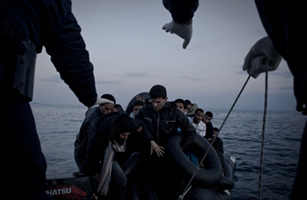
Chilly welcome Southern Europe is struggling under the weight of immigration
Hawa Sankoh speaks Greek to her two daughters, except, she admits, when she's angry. Then she sometimes slips back into the pidgin of her native Sierra Leone, but with mixed success. "They understand pidgin, but not so well," she sighs.
For 16-year-old Fatma, who goes by the Greek name Stephania, and Marie, 14, both born in Athens, Sierra Leone is a war-torn place they've only seen in documentaries and heard about from family members. But in the eyes of the Greek state — and most Greeks — they're still just temporary visitors to their adopted country. "The law is completely racist," says Sankoh, who moved to Greece 23 years ago, but like her two daughters, is still caught in an endless cycle of two-year-long residence permits. "You can't expect a child who grew up here ... to go back to their country. The children, they are just like the Greek children."
The Greek government agrees and has proposed legislation to address the problem. George Papandreou, the Socialist Prime Minister who was elected last October, has promised to grant citizenship to an estimated 250,000 children of migrants who were either born or educated in Greece, some of whom are currently stateless. Papandreou knows what it's like to be an outsider — although his father and his grandfather were both Greek Prime Ministers, he was born in the U.S. and spent most of his youth abroad. He has made improving Greece's dire immigration record a priority and says giving citizenship to "second-generation migrants," as they're called, is an issue of basic human rights.
The proposal has triggered a fierce backlash and sparked a long-overdue debate about what it means to be Greek. Right-wing parties have been the most vocal opponents of the plan, claiming the Greek people are a distinct race directly descended from the residents of ancient Athens and Sparta, and bound together by a common culture and the Greek Orthodox Church. But there's also a growing unease among everyday Greeks about the flood of new immigrants and the challenges they pose to the country's tight-knit, family-oriented society. When the government posted the draft citizenship law online, thousands of comments poured in. "Someone who is not of the Greek race cannot call themselves a Greek," wrote one person. "You are born Greek," said another. "You don't become Greek." The pressure prompted Papandreou to water down his initial proposal.
Immigration is new to Greece, a country whose people emigrated en masse throughout much of the 20th century. So new, in fact, that until 1991, the country used a law written in the 1920s to address the influx of Christians from Turkey after World War I. But one look at Sankoh's apartment building shows the changes that have taken place since the 1990s. Ten years ago, most of the residents were Greek. Today, the names on the intercom buttons are Bangladeshi, Bulgarian and Ugandan.
Noncitizens now make up more than 10% of Greece's population. The vast majority of these new arrivals come from neighboring Balkan countries, especially Albania. But in the last few years, Greece has also seen a surge of illegal immigrants from Africa and Asia, most of whom set off from Turkey in tiny boats and wash up on one of Greece's many islands. During the first half of 2009, almost a quarter of all European arrests of illegal immigrants took place in Greece — more than any other single country and twice that of Italy.
Without a coherent immigration strategy in place, the government has been overwhelmed by the volume of people. The country's detention centers have spaces for only 1,000 people, but more than 95,000 undocumented migrants came in the first nine months of 2009 alone. Most new arrivals are simply held for a short period before being released with a paper telling them to leave in a month. There's also a backlog of 42,000 unprocessed asylum claims, not to mention the thousands more people who have not yet been able to submit their applications. The chaotic system has created a vast underworld of migrants who are living in legal limbo on society's fringe and are turning parts of Athens into crime- and drug-ridden slums. Young African prostitutes are so ubiquitous now that Sankoh's daughters say they are frequently offered money by Greek men on the streets.
The new government recognizes the depth of the problems and has begun revamping the asylum system and trying to rein in police abuse, says Michalis Chrysochoidis, the minister responsible for immigration issues. But Chrysochoidis says the country will also tighten its borders, as well as build new detention centers and step up deportations, to send the message that Greece is no longer open to everyone. "Greece is facing a huge problem," he says. "You have to manage thousands of human souls with respect to human dignity, human rights, freedoms. And on the other hand you cannot host all these thousands of people because we are a small country."
While human-rights groups laud the government's intentions, they warn that a failure to tackle the immigration problem, combined with the current economic crisis engulfing Greece, could be explosive. "The climate in Athens is just getting worse and worse," says Alexia Vassiliou, a lawyer with the Greek Council for Refugees. "We've got to do something to relieve some of the pressure that's building up."